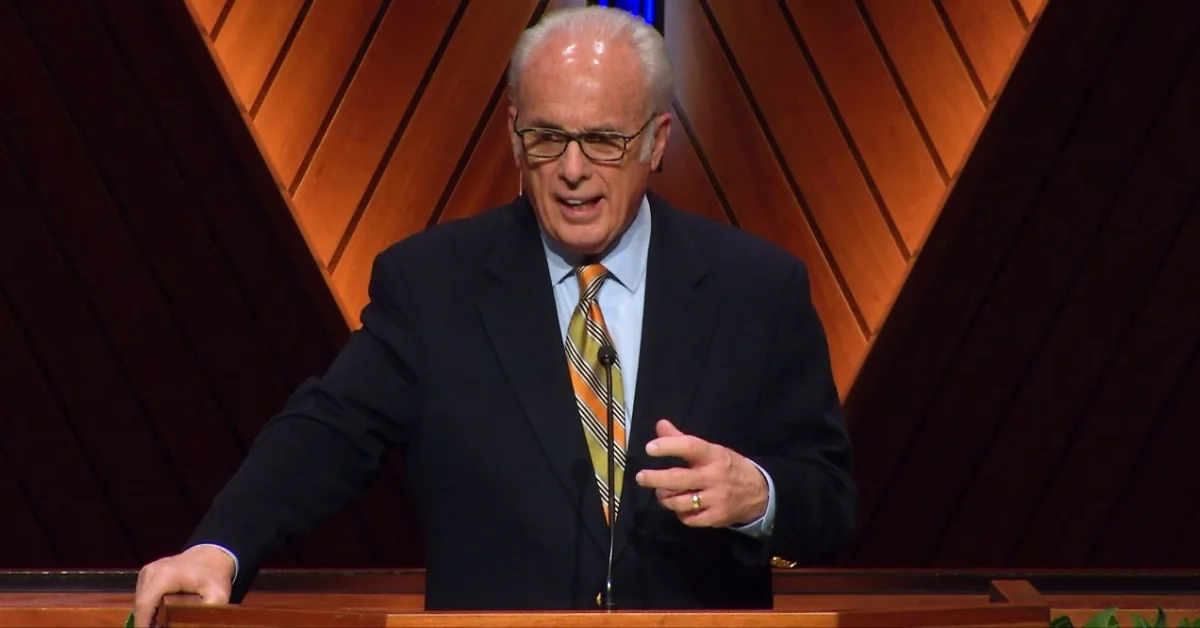John MacArthur stands as one of America’s most influential religious figures, known for his straightforward Bible teaching and strong stance against prosperity gospel. But what about his own finances?
This article dives into MacArthur’s estimated $14 million net worth, exploring how the pastor built his wealth through ministry roles, book royalties, and other ventures.
John MacArthur Net Worth
Current estimates place John MacArthur’s net worth at approximately $14 million as of 2025. This figure represents the accumulation of wealth throughout his 50+ year career in ministry, publishing, and education leadership. While this number hasn’t been officially confirmed by MacArthur himself, financial analysts have pieced together this estimate based on public records, tax filings, and known assets.
MacArthur’s wealth stands in stark contrast to his frequent criticism of prosperity gospel preachers. Unlike televangelists who openly flaunt luxury lifestyles, MacArthur has maintained a more modest public image while still accumulating significant wealth.
When compared to other prominent pastors, MacArthur’s net worth falls somewhere in the middle range. Joel Osteen, for example, has an estimated net worth of $100 million, while Rick Warren’s wealth was estimated at around $25 million before his retirement. On the lower end, many respected theological voices maintain net worths under $5 million.
John MacArthur’s Income Sources
MacArthur’s wealth stems from multiple revenue streams that have reinforced each other throughout his career.
1. Grace to You Salaries and Benefits
Grace to You (GTY), the media ministry that distributes MacArthur’s sermons worldwide, has been a significant source of income. According to public tax filings between 2005-2015, MacArthur reportedly received compensation averaging $250,000-$500,000 annually from GTY. This figure includes salary, benefits, and housing allowances.
What makes this arrangement notable is that these payments came in addition to his regular pastoral salary from Grace Community Church, where he has served as senior pastor since 1969. This dual compensation structure has raised questions among some religious watchdogs about potential “double-dipping” from related ministries.
Tax records show that GTY has operated with annual revenues between $15-20 million in recent years. The organization maintains that MacArthur’s compensation aligns with his substantial role in generating this revenue through sermon content and name recognition.
2. Master’s University & Seminary Compensation
As president of The Master’s University and Seminary (TMUS) from 1985 to 2019, MacArthur received additional compensation. While exact figures haven’t been publicly disclosed for all years, tax filings indicate presidential compensation at the institution ranged from $100,000-$200,000 annually during his tenure.
This third stream of income from a related ministry organization has contributed to the controversy surrounding MacArthur’s finances, particularly regarding questions of governance and oversight between interconnected religious organizations.
3. Book Royalties
Perhaps MacArthur’s most lucrative income source comes from his extensive publishing career. With over 150 books to his name, including the bestselling MacArthur Study Bible (which has sold millions of copies worldwide), his literary portfolio generates substantial royalty income.
Industry experts estimate that a successful study Bible can generate $2-5 million in royalties over its lifetime. MacArthur’s commentary series, which spans the entire New Testament, represents another major revenue source, with each volume potentially generating $50,000-$100,000 in annual royalties.
The ownership structure of these sermon-based materials has been controversial. While many churches retain rights to pastoral content created during paid church time, MacArthur has personally owned and profited from his sermon intellectual property—a practice that, while legal, differs from policies at many comparable institutions.
Nepotism, Luxury Homes, and IRS Scrutiny
MacArthur’s financial affairs have faced increasing scrutiny in recent years, with several controversies emerging around governance, nepotism, and lifestyle questions.
1. GTY Board Conflicts and Family Involvement
One persistent criticism involves the role of MacArthur’s family members within his ministry organizations. His son Matt has served as treasurer for Grace to You, while other family members have held positions within the interconnected ministries.
More seriously, MacArthur’s son Mark faced SEC charges in 2020 related to alleged financial fraud involving investment clients—a situation that, while separate from church operations, raised questions about oversight within the broader MacArthur family enterprises.
Phil Johnson, a close MacArthur associate who serves as executive director of Grace to You, has defended these arrangements, stating that family members are qualified for their roles and that proper governance procedures are followed. However, investigative reporting by Julie Roys and other journalists has highlighted potential conflicts of interest in board governance.
The 2019 resignation of The Master’s University and Seminary from the Evangelical Council for Financial Accountability (ECFA) during an investigation period raised additional red flags about financial transparency.
2. Property Holdings and Lifestyle
MacArthur owns a home in Santa Clarita, California, estimated to be worth $1.5-2 million based on local real estate values. Reports have also indicated ownership of vacation property in Colorado, though exact valuation is difficult to confirm.
Critics have pointed to these real estate holdings, along with gifts MacArthur has received (including a reported rare Bible collection with significant value), as evidence of a lifestyle that seems at odds with his theological position against material excess.
Defenders maintain that MacArthur’s lifestyle remains modest compared to many prosperity preachers, and that his property holdings represent prudent investment rather than extravagance.
3. IRS Disputes and Tax Questions
Tax treatment of MacArthur’s income has raised legal questions over the years. Religious ministers receive special tax benefits, including housing allowances that can substantially reduce tax burden. MacArthur’s classification of sermon royalties and speaking fees has reportedly been questioned in IRS reviews.
The “parsonage allowance” tax benefit allows ministers to receive housing benefits tax-free—a provision MacArthur has utilized while also benefiting from property appreciation. This legal but controversial tax strategy has allowed him to build wealth more efficiently than would be possible for non-clergy taxpayers.
Career Highlights

Understanding MacArthur’s wealth requires context about his impressive career trajectory and vast influence.
MacArthur began his ministry at Grace Community Church in 1969, building it from a congregation of 450 to over 8,000 regular attendees. This half-century of leadership represents remarkable stability in a profession known for high turnover.
The launch of Grace to You radio in 1977 dramatically expanded MacArthur’s reach. The program now broadcasts on over 1,000 stations daily and has created a massive archive of content that continues generating revenue years after initial production.
In 1985, MacArthur became president of The Master’s College and Seminary (now University), establishing himself as an educational leader and extending his influence to academic training of future pastors.
His publishing breakthrough came with The MacArthur Study Bible in 1997, which has sold millions of copies and been translated into numerous languages. This flagship product established MacArthur as a major force in Christian publishing, leading to lucrative deals for his subsequent books.
Throughout these ventures, MacArthur has maintained strict theological conservatism while building enterprises worth tens of millions of dollars—a balancing act that both supporters and critics find noteworthy.
Family Life
MacArthur’s family life has been intertwined with his ministry and finances in significant ways.
Patricia MacArthur, his wife since 1963, has maintained a lower public profile while supporting her husband’s ministry. The couple’s long marriage has been held up as exemplary within evangelical circles.
Their four children have followed various paths, with some directly involving themselves in their father’s ministry operations. As mentioned previously, son Matt has served as treasurer for Grace to You, while son Mark established a financial services firm that catered to ministry clients before facing SEC charges in 2020.
The family’s financial interconnections through ministry roles, shared board positions, and business relationships have created what critics describe as a “family enterprise” model that blurs lines between personal, ministry, and business finances.
Supporters counter that family involvement reflects shared values and efficient operations rather than impropriety, pointing to MacArthur’s decades of scandal-free ministry before recent controversies emerged.
Pastoral Wealth in Modern America
MacArthur’s financial situation reflects broader tensions within American religious life about pastoral compensation and wealth.
The average full-time pastor in America earns between $50,000-$100,000 annually, depending on church size and location. MacArthur’s multi-source income model has allowed him to far exceed these norms while maintaining theological positions that criticize excessive focus on material prosperity.
This apparent contradiction highlights the complex relationship between theology and finance in modern ministry. While MacArthur preaches against prosperity gospel—the teaching that God rewards faith with financial blessing—his own financial success raises questions about whether his practices align fully with his preaching.
Religious nonprofits like MacArthur’s operate under tax exemptions and limited disclosure requirements designed to separate church and state. This regulatory environment can make financial oversight challenging, as demonstrated by the controversies surrounding MacArthur’s interconnected organizations.
Final Thoughts
John MacArthur’s estimated $14 million net worth represents the complex reality of modern religious leadership. Through ministry salaries, book royalties, speaking engagements, and wise investments, MacArthur has built significant wealth while preaching a gospel that emphasizes spiritual rather than material prosperity.
His financial arrangements—particularly the overlapping board governance, family involvement, and intellectual property ownership—raise important questions about accountability in religious institutions. Yet many supporters maintain that MacArthur’s overall stewardship of resources has funded valuable ministry work reaching millions worldwide.
As with many prominent religious figures, the full picture of MacArthur’s finances remains partially obscured by privacy protections afforded to religious organizations. What’s clear is that his financial success demonstrates the potential for modern religious leaders to build wealth through brand building, content creation, and institution development—a model increasingly common in American religious life.
For those interested in understanding pastoral compensation and ministry finance, MacArthur’s case provides valuable insights into both the opportunities and pitfalls of building wealth while leading spiritual enterprises.
